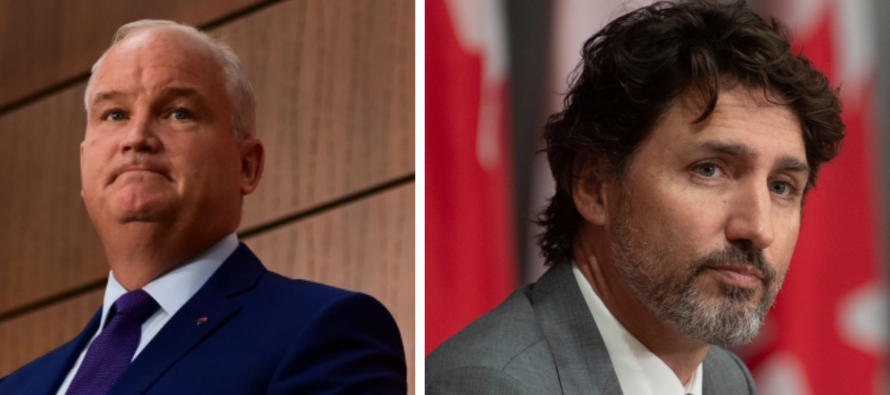
Trudeau approval stabilizes at 45 per cent
September 2, 2020 – Exactly three weeks from a scheduled re-opening of Parliament with a Speech from the Throne that may ultimately trigger a fall election, the latest public opinion data from the non-profit Angus Reid Institute finds the Liberal and Conservative Parties of Canada in a tie, with 35 per cent of decided voters each indicating they’d cast a ballot either for the incumbents or the official opposition.
This represents a small but perceptible four-point rise in fortunes for the CPC since May. The Liberals have largely survived the WE Scandal – for now – emerging over the same period of time two points lower than where they stood with the electorate in the spring.
The results of this poll of more than 5,000 Canadian adults suggests two strong undercurrents continue to pull and push against the other. The first: a committed and motivated Conservative base united in its desire to consign the Trudeau government to the annals of Canadian politics. The second: Liberal dominance in vote-rich Ontario and Canada’s big cities, places the CPC must be able to make inroads in order to win a general election.
Into this environment comes new CPC leader Erin O’Toole, tasked with convincing the centre-left he is an appealing choice – something his predecessor Andrew Scheer failed to do. O’Toole has room to grow, as significant numbers of non-CPC voters say they have yet to make up their mind about him.
More Key Findings: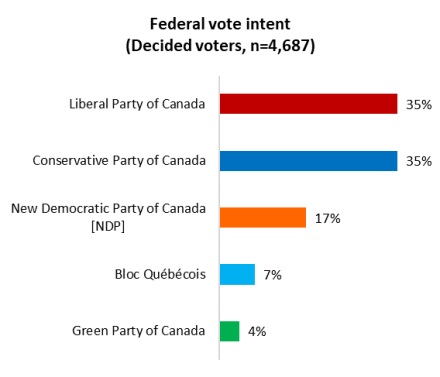
- Erin O’Toole – for now – is not yet defined in the minds of voters who did not choose his party in 2019. Significant numbers of past Bloc (45%), Liberal (43%) and NDP (38%) voters have not yet formed an opinion of the new CPC leader
- The Liberals still hold the high ground in Canada’s biggest cities – with double-digit leads over all other parties in and around Montreal, the Greater Toronto Area, and Metro Vancouver
- Pandemic response continues to be a source of strength for the Liberals. Two-thirds of Canadians (66%) say the government has handled this file well
About ARI
The Angus Reid Institute (ARI) was founded in October 2014 by pollster and sociologist, Dr. Angus Reid. ARI is a national, not-for-profit, non-partisan public opinion research foundation established to advance education by commissioning, conducting and disseminating to the public accessible and impartial statistical data, research and policy analysis on economics, political science, philanthropy, public administration, domestic and international affairs and other socio-economic issues of importance to Canada and its world.
INDEX:
-
Top issues
-
Vote intent
-
Regional breakdown
-
Age and gender
-
The Big Cities
-
-
Trudeau Approval
-
O’Toole has room to grow
Top Issues
An unbroken trend continues through the third quarter of 2020; Canadians top concerns remain the COVID-19 response and healthcare. As has been the case since the pandemic began earlier in the year, these issues top climate change and the economy, as anxiety about a second wave of the virus lingers:
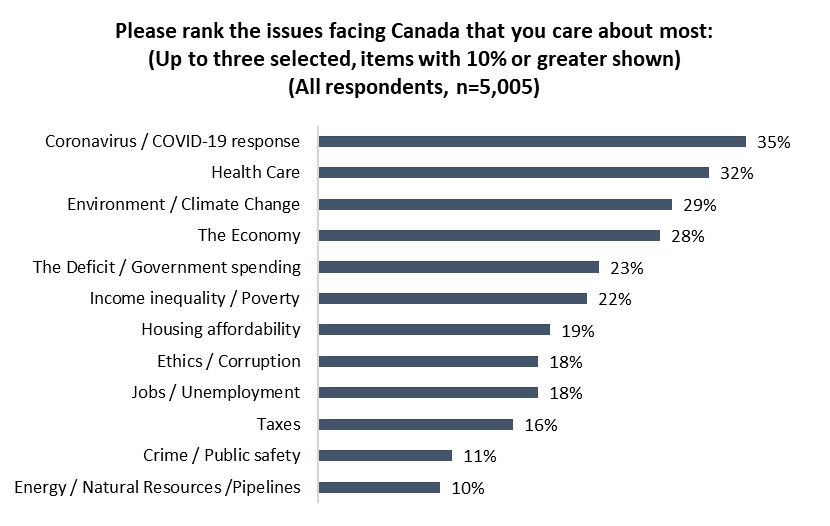
The massive, unprecedented $343 billon COVID-19 deficit rounds out the top five issues for Canadians. One factor perhaps working in favour of the governing Liberals is that despite the size of this spending shortfall, circumstances appear to be mitigating concern over the issue. While many have anticipated a rise in anxiety regarding paying the bill, worry over the deficit remains lower today than it was in 2019:
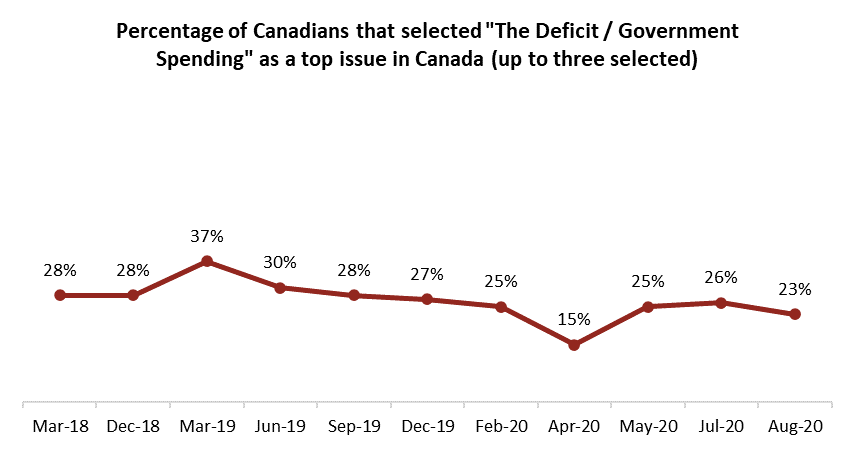
Further, the Trudeau government is buoyed by two-thirds of the population saying it has done a good job on COVID-19 response.
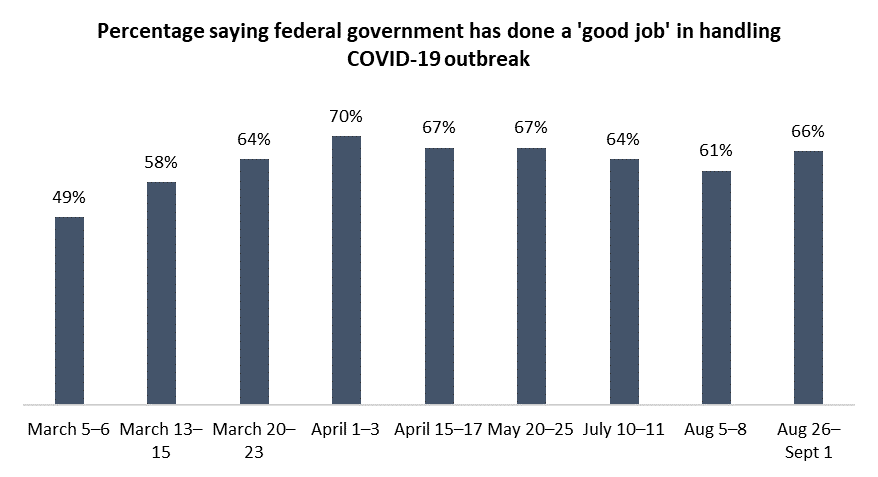
Vote Intent
Despite this, the incumbent Liberals face strong competition the Conservative Party of Canada, whose party based remains as solid and committed as ever. In late August, the CPC elected a new leader, Erin O’Toole. The party is currently tied in vote intention nationally, with both the Liberals and Conservatives at 35 per cent among decided voters. The NDP, which has supported the Liberal Party in a confidence vote already, and is expected to do so again when parliament resumes later this month, is chosen by 17 per cent of Canadians:
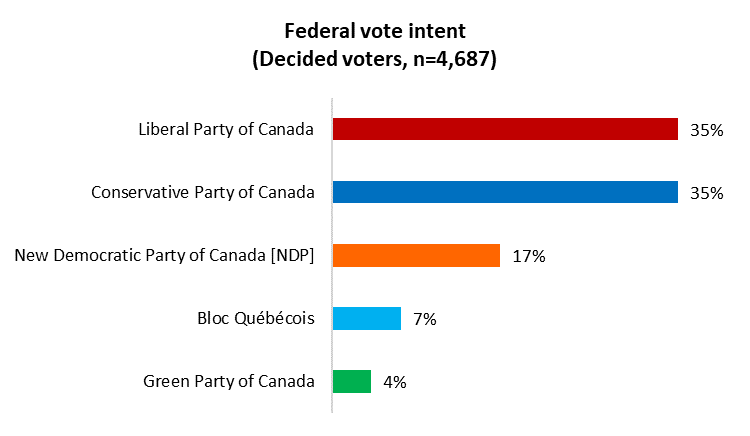
These latest data indicate a tightening of the vote intention picture, after the Liberal Party opened up a lead earlier in the pandemic:
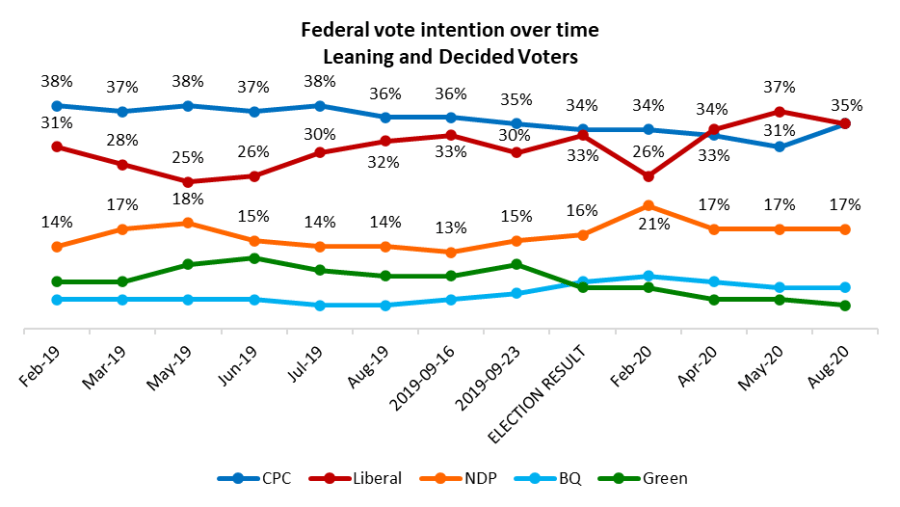
Nine-in-ten (90%) of those who supported the CPC in the last federal election would vote for the party under its new leader. The Liberal Party retains slightly fewer of its past supporters, two-in-five (81%) say they would vote for the party again:
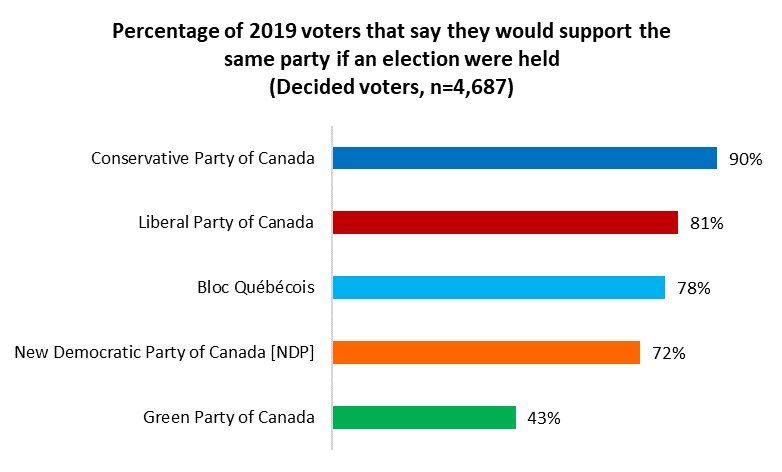
Erin O’Toole promoted himself as the candidate that can win Ontario, a goal of utmost importance if the party is to prevail in the next federal election. The data thus far suggest that he and his party have work to do, as the Liberal Party holds a seven-point advantage in Canada’s most populous province. The CPC maintains its stronghold in the prairies, with the Liberals holding an advantage in Quebec and Atlantic Canada. In British Columbia, the LPC and CPC are neck and neck, with a competitive NDP also in play:
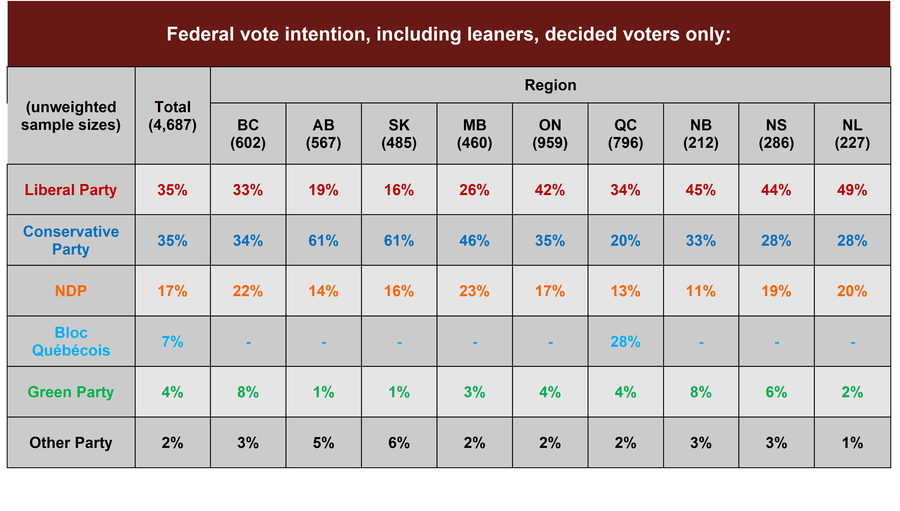
In Canada’s vote rich urban centres, the Liberals continue to hold a significant advantage. The incumbent party leads by at least 13 points in Vancouver, Toronto, and Montreal:
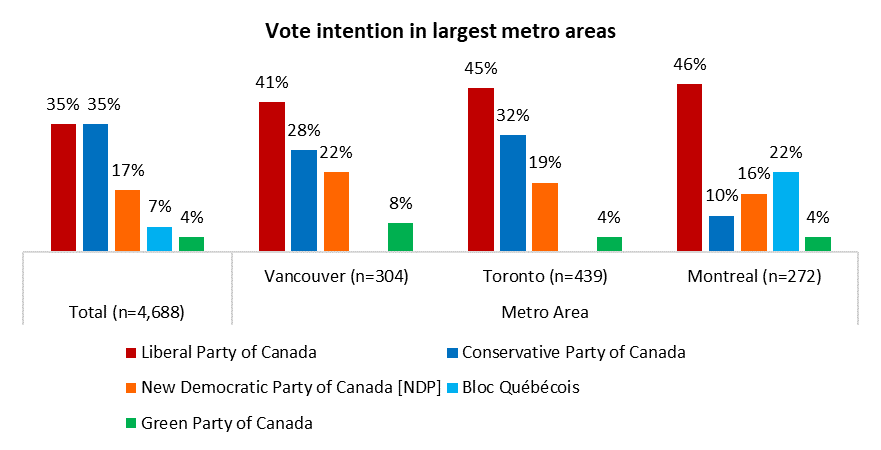
Justin Trudeau’s Liberals remain more popular with women than men, while the reverse is true of the Conservative Party. Notably, the NDP continue to perform well among younger voters:
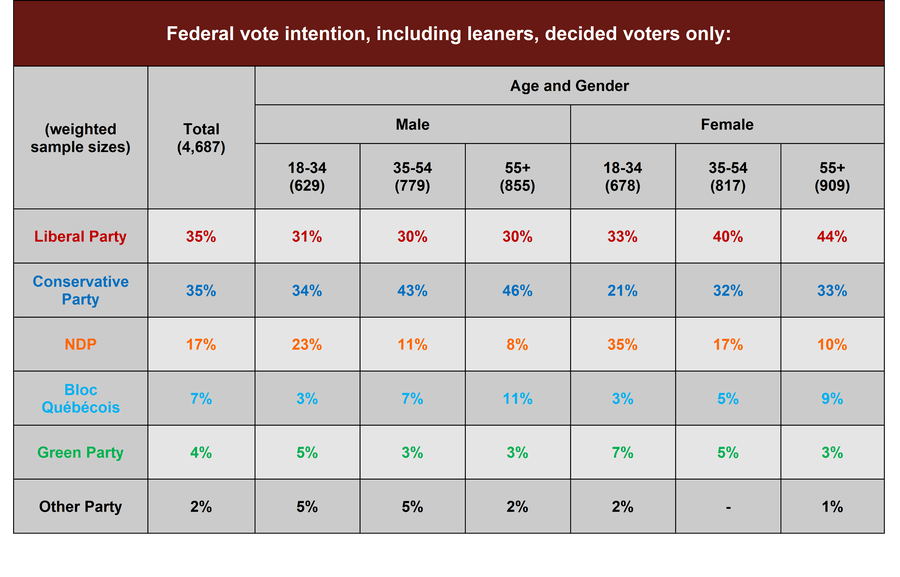
Trudeau Approval
After testifying against accusations of corruption in the WE Charity scandal, Prime Minister Trudeau re-confirmed that he would be on the ballot in the next federal election. Trudeau holds the approval of 45 per cent of Canadians this quarter, though the percentage of Canadians that strongly disapprove of him triples the number that strongly approve:
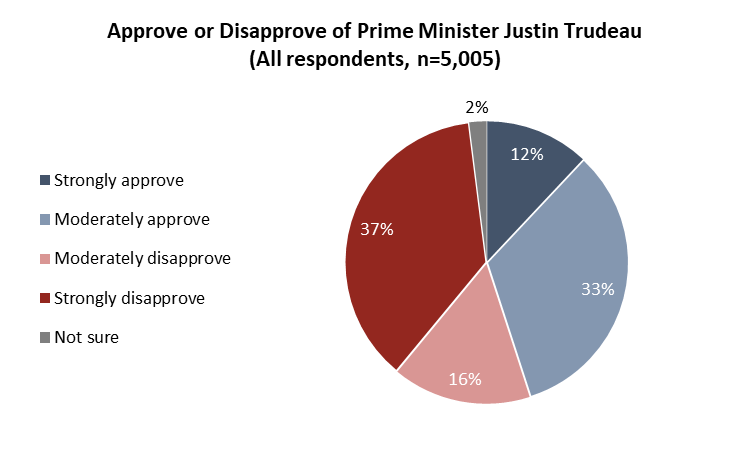
The Prime Minister’s approval has stabilized after dropping when news of the WE scandal broke earlier in the summer:
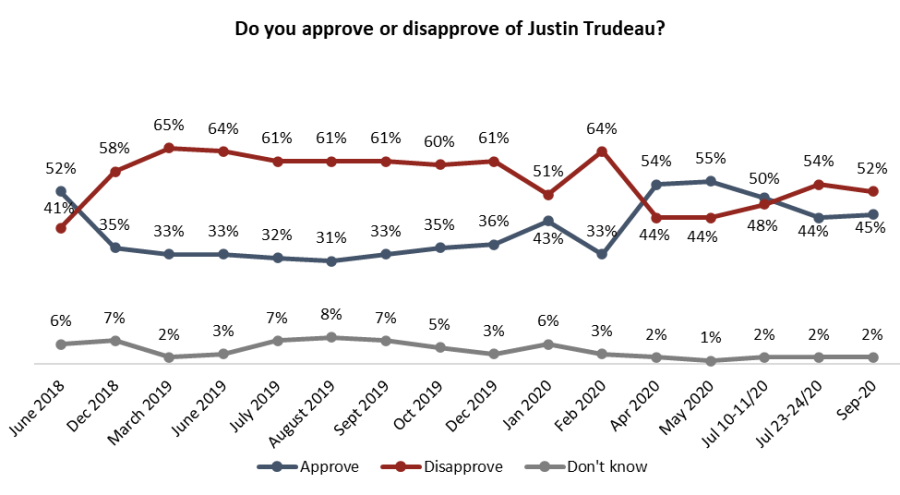
O’Toole has room to grow
The Conservative Party announced its new leader on August 24, though it took longer than the party had hoped due to a mechanical issues. New leader Erin O’Toole enters the national stage with a favourability rating of 30 per cent, and a plurality (39%) saying they don’t know enough about him to offer an opinion. The NDP’s Jagmeet Singh is approved of by 43 per cent:
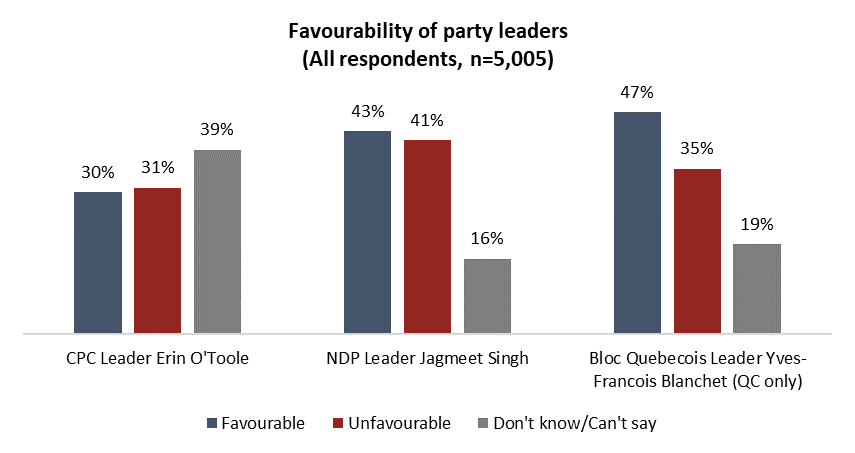
Notably, though the landscape facing O’Toole is certainly far different than the once Andrew Scheer faced when he took over party leadership, with the nation now in the middle of fighting a pandemic, the two leaders are evaluated near identically by Canadians at the start of their leadership term:
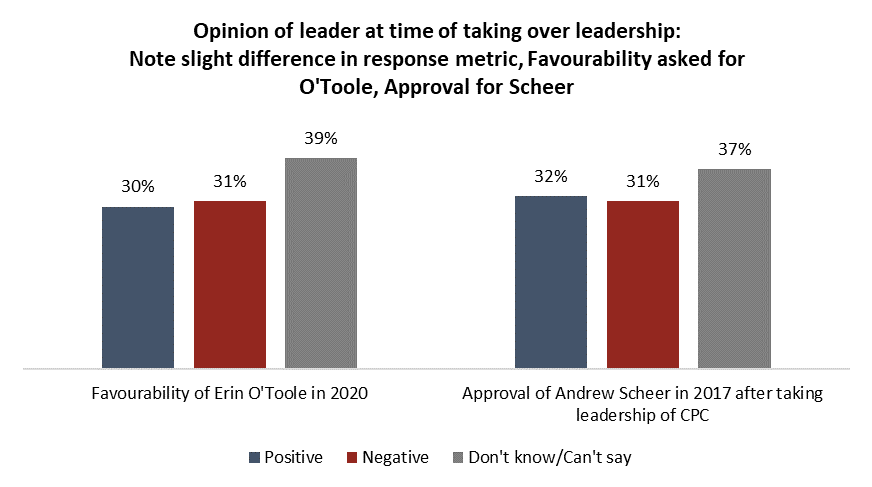
Further, the vote intention picture facing the CPC currently is largely the same as the one that faced Andrew Scheer in June of 2017, shortly after he won the CPC leadership:
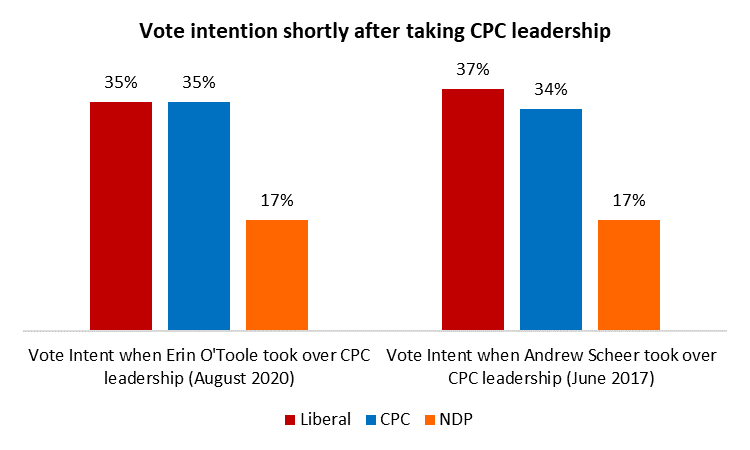
These early days of O’Toole’s leadership reign will be formative for both he and the party, as a considerable number of those who voted for a party other than the CPC say they have not yet made their mind up in terms of how they view the new party leader:
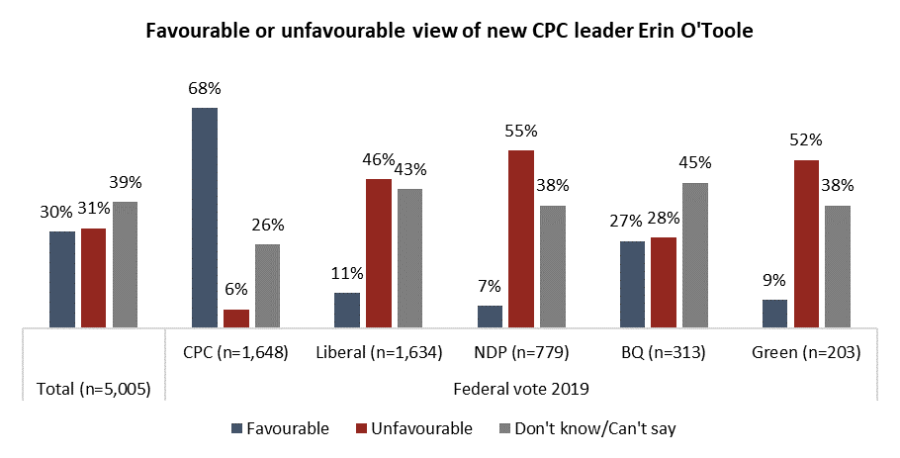
For detailed results by age, gender, region, education, and other demographics, click here.
To read the full report, including detailed tables and methodology, click here.
To read the questionnaire, click here.
MEDIA CONTACTS:
Shachi Kurl, Executive Director: 604.908.1693 shachi.kurl@angusreid.org @shachikurl
Dave Korzinski, Research Director: 250.899.0821 dave.korzinski@angusreid.org

